- Home
- Harlan Coben
Gone for Good (2002) Page 13
Gone for Good (2002) Read online
Page 13
She'd been dumped on the side of a road in Nebraska, he said. I nodded. She'd been murdered in to use Pistillo's words "a rather brutal fashion." I nodded some more. She had been found with no ID on her, but the fingerprints had matched and then Sheila's parents had flown in and identified the body for official purposes. I nodded again.
I did not sit. I did not cry. I stood perfectly still. I felt something inside me harden and grow. It pressed against my rib cage, made it almost impossible to breathe. I heard his words as though from afar, as though through a filter or from underwater. I flashed to a simple moment: Sheila reading on our couch, her legs tucked under her, the sleeves of her sweater stretched too long. I saw the focus on her face, the way she prepared her finger for the next page turn, the way her eyes narrowed during certain passages, the way she looked up and smiled when she realized that I was staring.
Sheila was dead.
I was still back there, with Sheila, back in our apartment, grasping smoke, trying to hold on to what was already gone, when Pistillo's words cut through the haze.
"You should have cooperated with us, Will."
I surfaced as if from a sleep. "What?"
"If you'd told us the truth, maybe we could have saved her."
Next thing I remember, I was out in the van.
Squares alternated between pounding on the steering wheel and swearing vengeance. I had never seen him so agitated. My reaction had been just the opposite. It was like someone had pulled out my plug. I stared out the window. Denial was still holding, but I could feel reality start hammering against the walls. I wondered how long before the walls collapsed under the onslaught.
"We'll get him," Squares said yet again.
For the moment, I did not much care.
We double-parked in front of the apartment building. Squares jumped out.
"I'll be fine," I said.
"I'll walk you up anyway," he said. "I want to show you something."
I nodded numbly.
When we entered, Squares reached into his pocket and pulled out a gun.
He swept through the apartment, gun drawn. No one. He handed me the weapon.
"Lock the door. If that creepy asshole comes back, blow him away."
"I don't need this," I said.
"Blow him away," he repeated.
I kept my eyes on the gun.
"You want me to stay?" he asked.
"I think I'm better off alone."
"Yeah, okay, but you need me, I got the cell. Twenty-four, seven."
"Right. Thanks."
He left without another word. I put the gun on the table. Then I stood and looked at our apartment. Nothing of Sheila was here anymore.
Her smell had faded. The air felt thinner, less substantial. I wanted to close all the windows and doors, batten them down, try to preserve something of her.
Someone had murdered the woman I love.
For the second time?
No. Julie's murder had not felt like this. Not even close. Denial was, yep, still there, but a voice was whispering through the cracks:
Nothing would be the same ever again. I knew that. And I knew that I would not recover this time. There are blows you can take and get back up from like what happened with Ken and Julie. This was not like that.
Lots of feelings ricocheted through me. But the most dominant was despair.
I would never be with Sheila again. Someone had murdered the woman I love.
I concentrated on the second part. Murdered. I thought about her past, about the hell she had gone through. I thought about how valiantly she'd struggled, and I thought about how someone probably someone from her past had sneaked up behind her and snatched it all away.
Anger began to seep in too.
I moved over to the desk, bent down, and reached into the back of the bottom drawer. I pulled out the velour box, took a deep breath, and opened it.
The ring's diamond was one-point-three carats, with G color, VI rating, round cut. The platinum band was simple with two rectangle baguettes.
I'd bought it from a booth in the diamond district on 47th Street two weeks ago. I'd only shown it to my mother, and I had planned on proposing, so she could see. But Mom had no good days after that. I waited. Still, it gave me comfort that she'd known that I had found someone and that she more than approved. I had just been waiting for the right time, what with my mother dying and all, to give it to Sheila.
Sheila and I had loved each other. I would have proposed in some corny, awkward, quasi-original way and her eyes would have misted over and then she would have said yes and thrown her arms around me. We would have gotten married and been life partners. It would have been great.
Someone had taken all that away.
The wall of denial began to buckle and crack. Grief spread over me, ripping the breath from my lungs. I collapsed into a chair and hugged my knees against my chest. I rocked back and forth and started to cry, really cry, gut-wrenching, soul-tearing cries.
I don't know how long I sobbed. But after a while, I forced myself to stop. That was when I decided to fight back against the grief. Grief paralyzes. But not anger. And the anger was there too, lingering, looking for an opening.
So I let it in.
Chapter Twenty-Two.
When Katy Miller heard her father raise his voice, she stopped in the doorway.
"Why would you go over there?" he shouted.
Her mother and father stood in the den. The room, like so much of the house, had a hotel-chain feel to it. The furniture was functional, shiny, sturdy, and totally lacking in warmth. The oils on the wall were inconsequential images of sailing ships and still lifes. There were no figurines, no vacation souvenirs, no collections, no family photographs.
"I went to pay my respects," her mother said.
"Why the hell would you do that?"
"I thought it was the right thing to do."
"The right thing? Her son murdered our daughter."
"Her son," Lucille Miller repeated. "Not her."
"Don't give me that crap. She raised him."
"That doesn't make her responsible."
"You never believed that before."
Her mother kept her spine stiff. "I've believed it for a long time," she said. "I just haven't said anything."
Warren Miller turned away and began to pace. "And that jackass threw you out?"
"He's in pain. He just lashed out."
"I don't want you to go back," he said, waving an impotent finger. "You hear me? For all you know, she helped that murdering son of a bitch hide."
"So?"
Katy stifled a gasp. Mr. Miller's head snapped around. "What?"
"She was his mother. Would we have done differently?"
"What are you talking about?"
"If it was the other way around. If Julie had killed Ken and needed to hide. What would you have done?"
"You're talking nonsense."
"No, Warren, I'm not. I want to know. I want to know if the roles were reversed, what would we have done? Would we have turned Julie in?
Or would we have tried to save her?"
As her father turned away, he spotted Katy in the doorway. Their eyes met and for the umpteenth time in her life, he could not hold his daughter's gaze. Without another word Warren Miller stormed upstairs.
He made his way into the new "computer room" and closed the door. The "computer room" was Julie's old bedroom. For nine years it had remained exactly the same as the day Julie died. Then one day, without warning, her father had gone into the room and packed up everything and stored it away. He painted the walls white and bought a new computer desk at Ikea. Now it was the computer room. Some took this as a sign of closure or, at least, moving on. The truth was just the opposite.
The whole act was forced, a dying man showing he can get out of bed when all it really did was make him sicker. Katy never went in there.
Now that the room had no tangible signs of Julie, her spirit seemed somehow more aggressive. You relied on
your mind now instead of your eyes. You conjured up what you were never meant to see.
Lucille Miller headed into the kitchen. Katy followed in silence. Her mother began to wash dishes. Katy watched, wishing also for the umpteenth time that she could say something that would not wound her mother deeper. Her parents never talked to her about Julie. Never.
Over the years, she had caught them discussing the murder maybe half a dozen times. It always ended like this. In silence and tears.
"Mom?"
"It's okay, honey."
Katy stepped closer. Her mother scrubbed harder. Katy noticed that her mother's hair had more streaks of white. Her back was a little more bent, her complexion grayer.
"Would you have?" Katy asked.
Her mother said nothing.
"Would you have helped Julie run?"
Lucille Miller kept scrubbing. She loaded the dishwasher. She poured in the detergent and turned it on. Katy waited a few more moments. But her mother would not speak.
Katy tiptoed upstairs. She heard her father's anguished sobs emanating from the computer room. The sound was muffled by the door but not nearly enough. Katy stopped and rested her palm on the wood. She thought that maybe she could feel the vibrations. Her father's sobs were always so total, so full-body. His choked voice begged, "Please, no more" over and over, as if imploring some unseen tormenter to put a bullet in his brain. Katy stood there and listened, but the sound did not let up.
After a while she had to turn away. She continued to her own room.
Then she packed her clothes in a knapsack and prepared herself to end this once and for all.
I was still sitting in the dark with my knees up against my chest.
It was near midnight. I screened calls. Normally I would have turned off the phone, but the denial was still potent enough to make me hope that maybe Pistillo would call and tell me it was all a big mistake.
The mind does that. It tries to find a way out. It makes deals with God. It makes promises. It tries to convince itself that maybe there is a reprieve, that this could all be a dream, the most vicious of nightmares, and that somehow you can find your way back.
I had picked up the phone only once and that was for Squares. He told me that the kids at Covenant House wanted to have a memorial service for Sheila tomorrow. Would that be all right? I told him that I thought Sheila would have really liked that.
I looked out the window. The van circled the block again. Yep, Squares. Protecting me. He had been circling all night. I knew that he would not stray far. He probably hoped that trouble arose just so he could unload on someone. I thought about Squares's comment that he had not been all that different from the Ghost. I thought about the power of the past and what Squares had gone through and what Sheila had gone through and marveled at how they'd found the strength to swim against the riptide.
The phone rang again.
I looked down into my beer. I was not one for drinking away my problems. I sort of wished that I were. I wanted to be numb right now, but the opposite was happening. My skin was being ripped off so that I could feel everything. My arms and legs grew impossibly heavy.
It felt as though I were sinking under, drowning, that I would always be just inches from the surface, my legs held by invisible hands, unable to break free.
I waited for the answering machine to pick up. After the third ring, I heard a click and then my voice said to leave a message at the beep.
When the beep sounded I heard a semi-familiar voice.
"Mr. Klein?"
I sat up. The woman on the answering machine tried to stifle a sob.
"This is Edna Rogers. Sheila's mother."
My hand shot out and snatched the receiver. "I'm here," I said.
Her answer was to cry. I started crying too.
"I didn't think it would hurt so much," she said after some time had passed.
Alone in what had been our apartment, I started rocking back and forth.
"I cut her out of my life so long ago," Mrs. Rogers continued. "She wasn't my daughter anymore. I had other children. She was gone. For good. That's not what I wanted. It was just the way it was. Even when the chief came to my house, even when he told me she was dead, I didn't react. I just nodded and stiffened my back, you know?"
I didn't know. I said nothing. I just listened.
"And then they flew me out here. To Nebraska. They said they had her fingerprints already, but they needed a family member to identify her.
So Neil and me, we drove to the airport in Boise and flew here. They took us to this little station. On TV they always do it behind glass.
You know what I mean? They stand outside and they wheel in the body and it's behind glass. But not here. They brought me into this office and there was this .. . this lump covered with a sheet. She wasn't even on a stretcher. She was on a table. And then this man pulled back the sheet and I saw her face. For the first time in fourteen years, I saw Sheila's face...."
She lost it then. She started crying and for a long time there was no letup. I held the receiver to my ear and waited.
"Mr. Klein," she began.
"Please call me Will."
"You loved her, Will, didn't you?"
"Very much."
"And you made her happy?"
I thought about the diamond ring. "I hope so."
"I'm staying overnight in Lincoln. I want to fly to New York tomorrow morning."
"That would be nice," I said. I told her about the memorial service.
"Will there be time for us to talk afterward?" she asked.
"Of course."
"There are some things I need to know," she said.
"And there are some things some hard things I have to tell you."
"I'm not sure I understand."
"I'll see you tomorrow, Will. We'll talk then."
I had one visitor that night.
At one in the morning, the doorbell rang. I figured it was Squares. I managed to get to my feet and shuffle across the floor. Then I remembered the Ghost. I glanced back. The gun was still on the table.
I stopped.
The bell sounded again.
I shook my head. No. I was not that far gone. Not yet anyhow. I moved toward the door and looked through the peephole. But it wasn't Squares or the Ghost.
It was my father.
I opened the door. We stood and looked at each other as if from a great distance. He was out of breath. His eyes were swollen and tinged with red. I stood there, unmoving, feeling everything inside me collapse away. He nodded and held out his arms and beckoned me forward. I stepped into his embrace. I pressed my cheek against the scratchy wool of his sweater. It smelled wet and old. I started to sob. He shushed me and stroked my hair and pulled me closer. I felt my legs give way. But I did not slide down. My father held me up. He held me up for a very long time.
Chapter Twenty-Three.
Las Vegas Morty Meyer split the tens. He signaled the dealer to hit both. The first came up a nine, the second an ace. Nineteen on the first hand.
And blackjack.
He was on a roll. Eight straight hands had gone his way, twelve of the last thirteen up a solid eleven grand. Morty was in the zone. The ever-elusive winner's high tingled down his arms and legs. It felt delicious. Nothing like it. Gambling, Morty had learned, was the ultimate temptress. You come after her, she scorns you, rejects you, makes you miserable, and then, when you're ready to give her up, she smiles at you, puts her warm hand on your face, gently caresses you, and it feels so good, so damn good.... The dealer busted. Oh yes, another winner. The dealer, a hausfrau with over treated hay like hair, swept up the cards and gave him his chips. Morty was winning.
And yes, despite what those bozos at Gamblers Anonymous tried to peddle, you could indeed win at a casino. Someone had to win, didn't they? Look at the odds, for chrissake. The house can't beat everyone.
Hell, with dice you can actually play on the house's side. So, of course, some people won. Some people went home with money
. Had to be.
Impossible any other way. To say no one won was just part of the overreaching GA crap that left the organization with no credibility. If they start off lying to you, how can you trust them to help?
Morty played in Las Vegas, Las Vegas the real Las Vegas, the city itself, no strip-strolling tourist trade in pseudo-suede and sneakers, no whistling and hollering or squeals of joy, no faux Statue of Liberty or Eiffel Tower, no Cirque du Sole, no roller coasters, no 3-D movie rides or gladiator costumes or dancing water fountains or bogus volcanoes or kid-appeal arcades. This was downtown Las Vegas. This was where grimy men with barely a mouth of teeth per table, the dust from their pickups still coming off them with each shoulder slump, lost their meager paychecks. The players here were bleary-eyed, exhausted, their faces lined, their hard times baked on by the sun. A man came here after slaving at a job that he hated because he did not want to go home to his trailer or equivalent, his abode with the broken TV, the screaming babies, the let-herself-go wife who used to stroke him in the back of that pickup and now eyed him with naked repulsion. He came here with the closest thing that he would ever know to hope, with that wispy belief that he was one score away from changing his life. But the hope never lasted. Morty was not even sure it was ever really there. Deep down, the players knew it was never meant to be. They would always be on the toe end of the kick. They were destined for a lifetime of disappointment, for slouching with their faces forever pressed against the glass.
The table changed dealers. Morty leaned back. He stared at his winnings and the old shadow crossed over him again: He missed Leah.
Some days he still woke up and turned to her, and when he remembered, the sorrow consumed him. He would not be able to get out of bed. He looked now at the grimy men in this casino. When he was younger, Morty would have called them losers. But they had an excuse for being here.
They may as well have been born with the loser L branded into their behinds. Morty's parents, immigrants from a shtetl in Poland, had sacrificed for him. They had sneaked into this country, faced terrible poverty an ocean away from everything familiar, fought and clawed all so their son would have a better life. They had worked themselves to an earlyish grave, hanging on just long enough to see Morty graduate medical school, to see that their struggle had meant something, had steered the genealogical trajectory for the better now and forever. They died in peace.

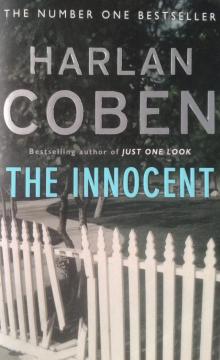 The Innocent
The Innocent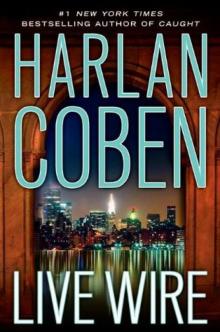 Live Wire
Live Wire Play Dead
Play Dead Drop Shot
Drop Shot Seconds Away
Seconds Away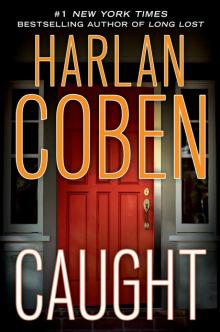 Caught
Caught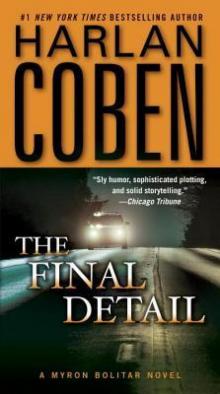 The Final Detail
The Final Detail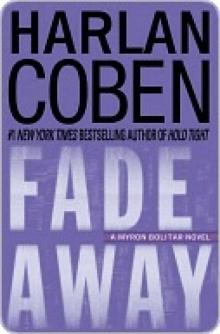 Fade Away
Fade Away Home
Home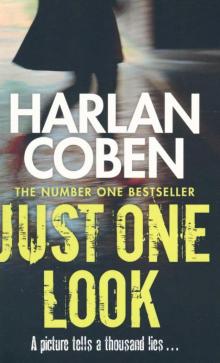 Just One Look
Just One Look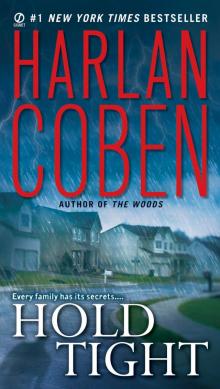 Hold Tight
Hold Tight Fool Me Once
Fool Me Once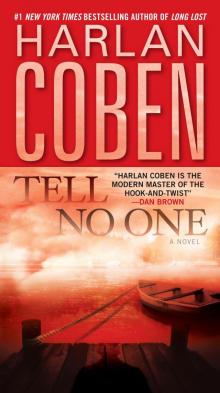 Tell No One
Tell No One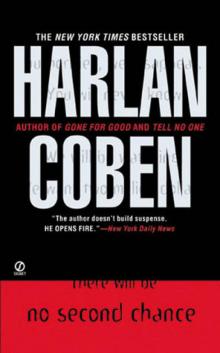 No Second Chance
No Second Chance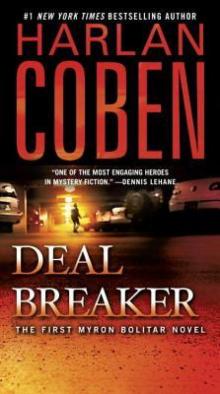 Deal Breaker
Deal Breaker Long Lost
Long Lost One False Move
One False Move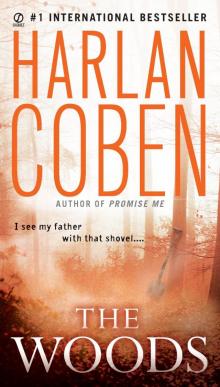 The Woods
The Woods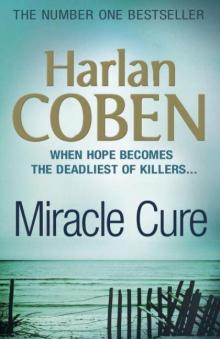 Miracle Cure
Miracle Cure Found
Found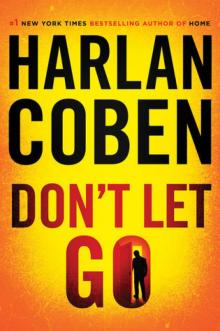 Don't Let Go
Don't Let Go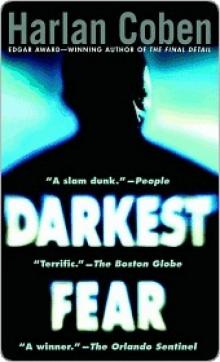 Darkest Fear
Darkest Fear The Stranger
The Stranger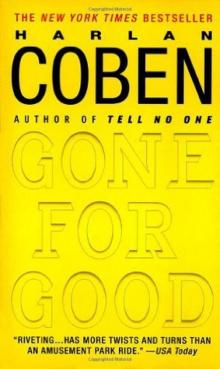 Gone for Good
Gone for Good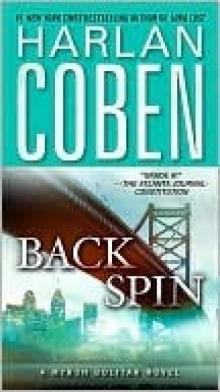 Back Spin
Back Spin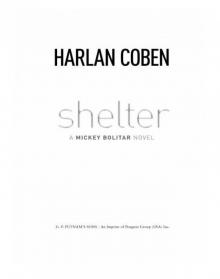 Shelter
Shelter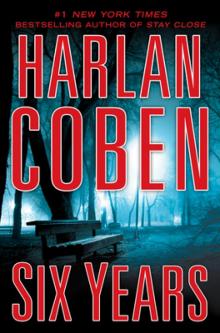 Six Years
Six Years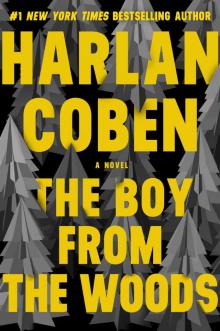 The Boy from the Woods
The Boy from the Woods Missing You
Missing You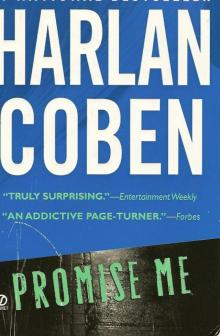 Promise Me mb-8
Promise Me mb-8 The Final Detail: A Myron Bolitar Novel
The Final Detail: A Myron Bolitar Novel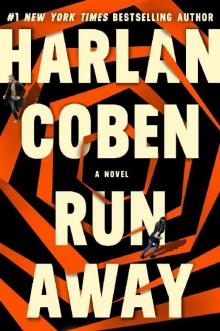 Run Away
Run Away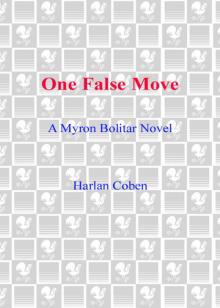 One False Move: A Myron Bolitar Novel
One False Move: A Myron Bolitar Novel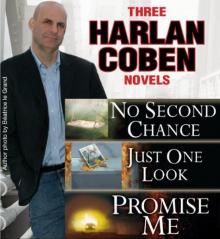 Three Harlan Coben Novels
Three Harlan Coben Novels the Woods (2007)
the Woods (2007) Tell No One (2001)
Tell No One (2001) the Innocent (2005)
the Innocent (2005)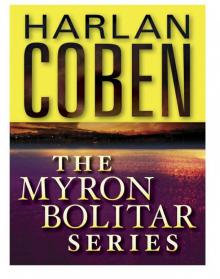 The Myron Bolitar Series 7-Book Bundle
The Myron Bolitar Series 7-Book Bundle Gone for Good (2002)
Gone for Good (2002) Caught (2010)
Caught (2010) Hold Tight (2008)
Hold Tight (2008)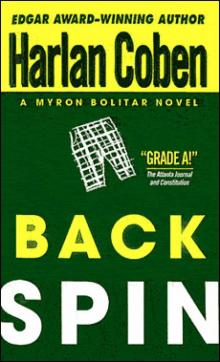 04 - Back Spin
04 - Back Spin Miracle Cure (1991)
Miracle Cure (1991) Harlan Coben 3 Novel Collection
Harlan Coben 3 Novel Collection Just One Look (2004)
Just One Look (2004)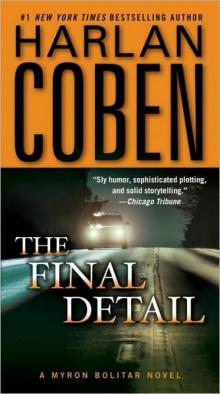 The Final Detail mb-6
The Final Detail mb-6 Play Dead (2010)
Play Dead (2010)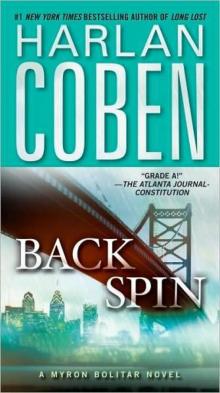 Back Spin mb-4
Back Spin mb-4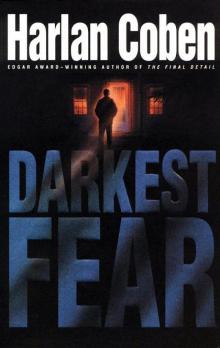 Darkest Fear mb-7
Darkest Fear mb-7